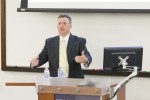Earlier this year, Shaun McCutcheon, the owner of an Alabama electrical development company, challenged a campaign finance contribution limitation statute in the Supreme Court and won. On Tuesday, McCutcheon visited the UCLA School of Law to participate in a panel and debate about the court’s ruling on his case.
The American Constitution Society and Federalist Society chapters at UCLA invited McCutcheon to be the opening speaker for a jointly hosted debate between visiting law professors.
Students and faculty filled the seats inside a law school lecture room to listen to Jessica Levinson, who spoke on behalf of the American Constitution Society, participate in a debate against John Eastman, a visiting professor from Chapman’s Dale E. Fowler School of Law, over the results of the case.
McCutcheon, who won the suit in a 5-4 vote earlier this year, said he made his case on the grounds that limiting personal campaign contributions is unconstitutional because it restricts contributors’ rights to support candidates.
He said the Federal Election Commission summoned him after noticing he had come close to exceeding campaign finance limitations for the nine candidates he had supported through donations.
“It’s about the right to select our leaders … including raising money and spending money on speech,” McCutcheon said.
McCutcheon said that during the last election cycle, he had contributed money to various political action committees and to nine candidates, and was notified by the FEC that he was approaching the aggregate limit for contributions per candidate.
The FEC, which regulates campaign finance legislation, normally prohibits contributors from donating to more than nine candidates and doesn’t allow for more than $2,600 in contributions per candidate, Eastman said.
Levinson and Eastman debated various campaign finance issues the McCutcheon ruling raised, including the need for a distinction between corruption and the appearance of corruption in campaign donations.
McCutcheon, who commented on various points raised throughout the debate, said that this unestablished distinction was one of his chief points of contention with campaign finance limitations.
“What’s the difference between nine or ten candidates? Why does corruption always start with numbers?” McCutcheon said.
Defending the court’s finding that campaign finance contribution limitations were unconstitutional, Eastman challenged the notion of money as speech and instead described money as a legitimate means to acquire influence.
“That’s the way democracy works. It’s tied to influence. Restrictions are a backdoor attempt to level the playing field between rich and poor. But if the means are limited, speech is limited,” Eastman said.
Eastman added that the threat of democratic tyranny is just as valid a concern if individual rights tied to the voting majority are protected over property concerns.
“The problem is the thought of large corporations participating in corporate cronyism,” Eastman said.
Levinson described the government’s interest in upholding restrictions as motivated by a desire to protect electoral institutions. She compared enormous campaign finance donations to the use of a sound truck.
“(We need to) lower the volume so we can hear other things. Limitations support free speech and the first amendment rights of those speakers without money,” Levinson said.
Toward the middle of the debate, Levinson shifted its focus from the competing first amendment rights of wealthy and less-than-wealthy campaign contributors to the rights of people listening to campaign messages.
“Listeners are also supported (by the limitation) because they are able to hear a greater depth and breadth of messages,” Levinson said.
In response to both Eastman and McCutcheon’s view of campaign finance restrictions as incumbent protection laws that allow government officials to effectively reelect themselves, Levinson again invoked the interests of listeners.
“A small percentage of the electorate being able to overwhelm what we hear is a problem,” Levinson said.
